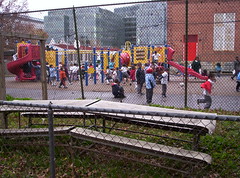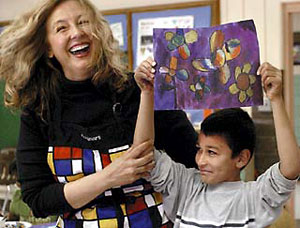If money fixed everything wouldn't we have a great society? (Schools brief)
 Kids playing at Logan School playground
Kids playing at Logan School playgroundThere is a campaign in the city to get the city to commit $1 billion to schools infrastructure. Great cities have great school systems. And great neighborhoods generally have great neighborhood schools. Quality elementary schools in particular tend to be the foundations of stable neighborhoods.
But I have a hard time mustering up the will to support this campaign, because I fear the money will be wasted. Maybe it's because I pay too much attention to the hundreds of millions of dollars expended over the years on "community development" through community development corporations, the DC Department of Housing and Community Development, or even the unintended consequences of new recreation centers that charge daily fees for use, and seem to attract out-of-city patrons and there seems to be some link to disorder increases in the general area around the new facilities (at least in areas that would be defined as transitioning or emerging). There's very little to show (in my opinion anyway) for all this money.
$1 billion is a lot of money to waste.
Newspapers for the last couple days have a bunch of interesting pieces that relate to local schools issues. Harry Jaffe has a good column in today's Examiner, "A golden opportunity for D.C. schools," that suggests that the DC School Board President be a full-time paid position comparable to that of a DC City Councilmember. I think that's an excellent idea. But there's a lot more that needs to be done in order to fix schools.
The area that I have been thinking a lot about since the summer is the "inputs" side of the equation. Until we have families and peer groups that support learning, we're not going to be able to improve outcomes. School systems can only do so much.
Marc Fisher has a column about this today. Entitled "Power to Immigrant Parents," he writes:
Teachers send out invitations, call parents, tuck reminders into kids' backpacks, then, on the evening of parent meetings, barely a handful of moms and dads show up. Inevitably, teachers get frustrated and decide the parents just don't give a hoot. I've heard that exasperated conclusion hundreds of times, in cities and suburbs alike. Those teachers need to meet Rosa Sanchez. ...
Sanchez, 32, has four children in the Montgomery schools, and for a long time, she packed her kids onto the bus in the morning and considered her parenting job complete for the school day. Like her own mother, who worked two jobs, spoke no English, had no car and never visited Rosa's school, Rosa assumed that if she did stop by her kids' schools, she'd be greeted with sneers. "I felt like they didn't want me there, only white people go in to help. It wasn't for me," she says.
But when her children struggled at school, Sanchez was invited to join a parent-training program created by Impact Silver Spring, a nonprofit that teaches immigrants to take a more active role where they live and work. Sanchez learned how to read a report card, press for the right class placements and make sure her kids get the attention they need.
More important, Sanchez learned not only that she was welcome but also that schools desperately crave involvement from immigrant parents. Educators know that active parents are essential to boosting minority achievement in a school system where test scores can be predicted all too easily by the ethnicity of the child.
A year after her training, Sanchez is a regular at her children's schools, climbing onto the bus each morning, volunteering in the office, cleaning up, reading to children in Spanish or English. She found work as Montgomery Blair High School's outreach coordinator for Hispanic parents. And now she leads one of the training groups.
__________________
This isn't much different from what I wrote a couple weeks ago, in the blog entry "Chile, me, and civic engagement," about a text commonly used to teach English as a second language. The book, Communicating Effectively in English, does this through teaching people on the techniques they need to use to be able to be involved active citizens. I have also discussed a number of times the "Positive Deviance" model and the example of "Family Learning Contracts" in Brazil as a way to create families fully committed to their children's educational success.
(Also see previous blog entries "Involving the community in school improvement" and "School daze.")
Generally, lower income families have the same sense of efficacy that Rosa Sanchez had before she took the parent-training program at Impact Silver Spring. It happens that I am poking through a new book The Deliberative Democracy Handbook, which is about deliberative citizen engagement programs like the one in Silver Spring.
We need the same kinds of civic engagement training programs to be linked to school improvement planning in DC, if we are truly committed to "creating a community of learning" or a community of people that have a sense of efficacy.
My experience with children's issues over the past almost 20 years is that people talk about how they care about children's issues, but when it comes time to follow through, it's rarely forthcoming, other than buying educational toys maybe, but even there, retail chains focusing on educational toys tend to go out of business...
And I have always been intrigued by the fact that the average person doesn't take a deliberative, learning-based approach to civic issues. I attribute this to bad experiences in schools and a belief that research and learning practices are associated with school-based settings only, not "real life."
If we had a real community-wide planning and involvement initiative dedicated to creating a "Community of Learning," then I would feel differently about the campaign for $1 billion to fix DC schools.
We need great schools to have a great city and great neighborhoods.
But it's not a question of money as much as it is will and focus and getting the entire community, especially the families of the children in the schools, to commit to building the community's capacity, willingness, desire, and commitment to be engaged in the process from the beginning to the end.
_______
 Photo by XAVIER GALLEGOS/ Tucson Citizen. Peter Howell Elementary School art teacher Shirley Wagner smiles as Samuel Durbin shows his finished sunflower painting.
Photo by XAVIER GALLEGOS/ Tucson Citizen. Peter Howell Elementary School art teacher Shirley Wagner smiles as Samuel Durbin shows his finished sunflower painting.Yesterday's Washington Times has a nice story on arts-based education programs ("Arts used as teaching tool at select schools in the area.) This dovetails on the idea that I have put out there that the schools in the H Street area should become an "arts cluster" school system within the system dedicated to performance, visual, media, English language and foreign language arts and culture. This would complement the creation of an "arts and entertainment" district at the eastern edge of the H Street NE neighborhood.
Yesterday's Times also had a story, "A big reason to graduate in Kalamazoo," about how "a local benefactor has promised to fund the college education of any student who graduates from one of Kalamazoo's three public high schools."
Talk about building a community's commitment to public education...
Finally, our friend Gov. Jeb Bush (I try not to write about national politics in this blog, other than the vagaries of federal interest and commitment to urban issues, but a friend and I were wildly speculating about the best possible Republican ticket in 2008 -- I said Condi Rice as pres. + Jeb as veep, or maybe just keep Cheney...) had a piece in yesterday's Wall Street Journal entitled "Five Rules for School Reform":
1. The first rule is that when you run for office, you need to say what you're going to do and then do what you said you would.
2. ... if you don't measure, you don't care. You have to be willing to measure the outcome of reform and to let the world know what the real results are...
3. ... big reforms require long-term commitment (at last night's urban design presentation sponsored by Washington Regional Network for Livable Communities, Paul Morris asked what happened in our communities, that we used to build infrastructure for our lifetimes, now we look at it in terms of a two-year commitment)
4. ... communicate what you're doing, especially to parents. Education reform can only be sustained if parents know it's working. Florida gives parents a comprehensive report card tracking their child's performance year-over-year, along with the school's performance against state and national standards and explanations of each.
5. ... success is never final and reform is never finished. You are either in ascendance or decline, so if you aren't moving forward you are losing ground as well as opportunities for students.
Index Keywords: education



0 Comments:
Post a Comment
<< Home